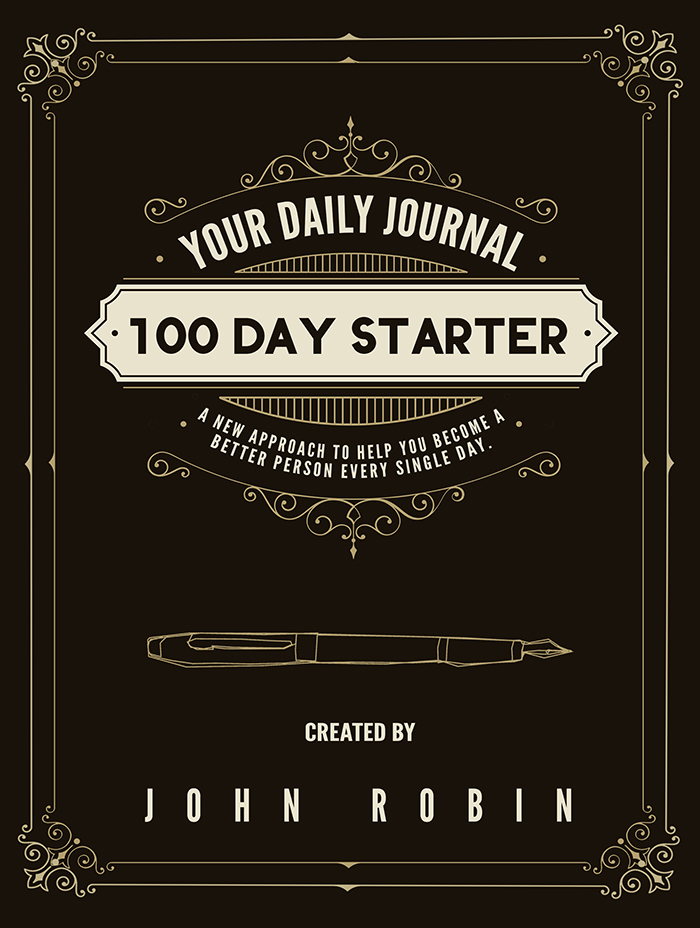Today, my World Builders guests are Brian and Juliet Freyermuth, game designers and urban fantasy authors.
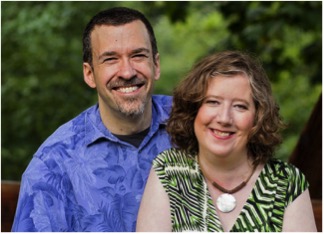 After 18 years of marriage, Brian and Juliet Freyermuth decided to try something crazy; write a book together.
After 18 years of marriage, Brian and Juliet Freyermuth decided to try something crazy; write a book together.
Following his passion and creativity Brian began his game design career with the award-winning computer role-playing game, Fallout and hasn’t looked back. For twenty years he wrote and designed games such as Fallout, Star Trek: Starfleet Academy, Epic Mickey 2 and Tales from the Borderlands.
For many years, Juliet wrote resumes for the game industry, helping professionals gain their confidence in the ever-so-frustrating task of looking for a job. She believes life should be filled with wonderful, if not crazy experiences. Once her friend talked her into modeling for his LARP book Fading Suns: Passion Play.
Together Brian and Juliet enjoy writing a series about a world where the supernatural are completely reliant on popular belief. A powerful Norse goddess is now a librarian. A vampire can now go out in the sun for a little bit and wear a crucifix. And a popular Troll in Seattle can kick some serious butt.
When Brian and Juliet aren’t writing, they enjoy reading, watching shows like Dr. Who and going on road trips with their son, Kyle.
Here, now, are Brian and Juliet’s insights on world building.
What is the appeal of world building to you? How does it compare to the importance of character and plot?
Brian & Juliet >> Hey John, thanks for having us.
Juliet >> Brian does most of the world building, so I will just add to his stories 🙂
Brian >> I’ve loved to build worlds since I was a little kid. As a freshman in High School, I wrote my first fantasy novel. I had the histories of all the elven and human nations, and had a great time drawing a map of the world.
Juliet >> Brian, wrote a horror novel back then. He let me read it the day after we met in high school. Scared the bejeezes out of me! That was more world than plot and very graphic.
Brian >> The interesting thing about horror is that it takes our world and puts a dark shadow underneath, like the creature under the bed. But the book was still based in our world.
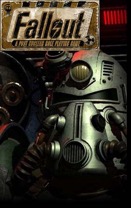 Video games are a different beast. I wouldn’t realize how elaborate world building could become until I became a designer on the video game, Fallout where I came up with a timeline for a post-apocalyptic world. I took the present society and moved it forward a hundred years, to a nuclear war.
Video games are a different beast. I wouldn’t realize how elaborate world building could become until I became a designer on the video game, Fallout where I came up with a timeline for a post-apocalyptic world. I took the present society and moved it forward a hundred years, to a nuclear war.
Juliet >> World building was an ever changing process on Fallout. I listened to the guys brainstorm as we played Bomberman on Thursday nights after work. One area that didn’t make it in was a Matterhorn ride filled with cult members.
Brian >> For me, histories and timelines are amazing tools, but you have to balance it with the actual story. Too much world-building and you get some pretty boring exposition. Too much plot and character and you end up with a world that’s not believable.
What aspects of the world do you have to figure out before you start a story? What do you allow to unfold as you write?
Brian >> Most of the upfront work on story is about history. The history of the universe, the history of each race, and finally, the history of the characters themselves. You can thank Tolkien for that one. Lord of the Rings was the very first book I read that had centuries and centuries of history. Kings, wars, famines, prosperity, it was all there.
 For example, when writing for the game Run Like Hell, I had to fling the human race forward about 500 years. I had to make a timeline of how we got into space, how we met the other alien races, how we interacted with them, how we came to be in a space war that lasted decades, and anything else to fill in the gaps.
For example, when writing for the game Run Like Hell, I had to fling the human race forward about 500 years. I had to make a timeline of how we got into space, how we met the other alien races, how we interacted with them, how we came to be in a space war that lasted decades, and anything else to fill in the gaps.
Then I went through each race and came up with their histories. The Jaxn’trep race was a warrior reptilian race that barely got off their planet because of their joyous need for conquest. You can guess that humanity’s first encounter with them didn’t go very well.
Finally, I took each character, from the main character, to the Jaxn’trep security chief, to the alien doctor who race was once at war with the humans, and wrote out the personal histories of each of them, and how they all fit in.
But it’s all got to be flexible too, especially in the first story of a series. My first novel, Demon Dance, had pages of history on the different factions of the supernatural world, but it changed a lot by the time I wrote the end. As the series goes on, there will less and less leeway, but in the beginning you can really be flexible. Just make sure you know how any changes ripple through the rest of your world, and adjust accordingly.
Juliet >> What I like about our world is figuring out how mythologies come into play in our world. It isn’t simply “insert supernatural creature here”. We have to figure how popular they are and what people think their abilities are. How does a deity deal with being stripped of their powers? Can vampires go out in sunlight? Do they have a soul?
Brian>> Yeah, we try to start with a base of actual truth, and then build on it from there.
What do you enjoy the most about world building?
 Brian >> I love coming up with timelines and the backgrounds of my world. Thinking about how people and society will evolve over time with their circumstances. If the world has magic, how would that affect the society? Would they shun the magic, or use it like technology? If a virus spread through the world and turned people into ghouls, how would that affect the towns and political structure? All of this stuff fascinates me.
Brian >> I love coming up with timelines and the backgrounds of my world. Thinking about how people and society will evolve over time with their circumstances. If the world has magic, how would that affect the society? Would they shun the magic, or use it like technology? If a virus spread through the world and turned people into ghouls, how would that affect the towns and political structure? All of this stuff fascinates me.
Juliet >> We have a group called the Watchers in our series. They are kind of the supernatural men in black. Basically they keep things in order and the public oblivious. Well, most of the public. I like creating the rules with Brian as to what the Watchers will and won’t get involved with and their inner conflicts.
Have you learned tips on world building from other authors in your genre? If so, what are they?
Brian>> Like I said, Tolkien was my first. Reading the Lord of the Rings was one of the coolest things ever when I was kid. That was followed up by the Dragonlance novels, which had amazing world building in them. (They were role playing games after all) But the one I think had the most effect was something called the Death Gate Cycle, by Margaret Weiss and Tracy Hickman. Here was a story that had some of the strangest magical worlds I’ve ever read, and yet they all made sense. Especially at the end of the series when it was explained how they came about and who created them. It really was an amazing feat of world building.
Juliet >> I’ve been a huge fan of Stephen King since I was a kid. Everyone should read On Writing. Patricia Briggs definitely has an influence too.
How do you balance realism with magic or other world building elements that allow for departure from the ordinary?
Brian >> My philosophy is simple. People will accept any magical, supernatural or science fiction world as long as there are concrete rules. Even if your “magic” is pure chaos, the world shouldn’t contradict itself on a whim. There is cause and effect to everything. Magic might be all powerful, but there needs to be a downside.
In Fallout, there was an FEV virus that turned people into mutants. As the developers, we knew exactly why certain people were affected and others weren’t. We knew why there were powerful Super Mutants and lesser ghouls. We had rules that we tried not to contradict.
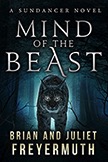 Juliet >> I agree with Brian. Rules are essential. Then you can conform your characters to work around those rules. In Demon Dance and Mind of the Beast we are constrained by a couple of rules. First, the character, supernatural or not, has to do their best not to get the public’s attentions to avoid the Watchers’ wrath. We also need to have the character’s reality dependent upon popular belief. For example, our Norse Goddess is getting more power because of the Thor movies.
Juliet >> I agree with Brian. Rules are essential. Then you can conform your characters to work around those rules. In Demon Dance and Mind of the Beast we are constrained by a couple of rules. First, the character, supernatural or not, has to do their best not to get the public’s attentions to avoid the Watchers’ wrath. We also need to have the character’s reality dependent upon popular belief. For example, our Norse Goddess is getting more power because of the Thor movies.
In your opinion, what is it that makes a believable and immersive world for a fantasy story?
Brian >> Every story at its core is a story about human nature. You might have dragons and wizards, but if you don’t have believable and relatable characters, your story sinks. Even if your characters are elves or aliens, their needs and flaws are something you should relate to. Is your elf lord abandoned by his father? Yup, that’s a basic archetype that the reader can relate to.
In Fallout, the main bad guy was called the Master. He was the creator of the Super Mutants, and even though he was a horrific, mutant villain, he had a very basic, relatable need. His “children” couldn’t breed. So his whole reason was to stop his Super Mutants from becoming extinct.
Your characters might be strange and your world might be completely bonkers, but at the core you need to tell a story about people and their struggles. That’s something we all can relate to.
Juliet >> Absolutely. In Mind of the Beast, there’s a god whose power is seriously diminished and became a drug addict because he couldn’t cope with his new reality.
Thanks for stopping by my blog, Brian and Juliet! It was great to learn more about you and the world you write in!
Brian and Juliet>> Thanks for having us, John! This was a lot of fun and we hope this helps others in their world building adventures.
Be sure to check out Brian Freyermuth’s urban fantasy novel, Demon Dance:
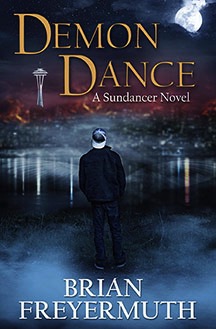 Nick St. James was born different. His extraordinary gifts let him to see and survive the magical underworld that lives beneath our reality. Despite all that power, he couldn’t save the thing he loved most: his wife.
Nick St. James was born different. His extraordinary gifts let him to see and survive the magical underworld that lives beneath our reality. Despite all that power, he couldn’t save the thing he loved most: his wife.
Determined to forget his old life and a world where angels and demons fight for our very souls, Nick’s miserable existence is somewhat peaceful. When a demon slaughters his ex-partner and marks him for death, he needs to reopen old wounds and use all his gifts to find out who summoned the beast.
As he gets closer to the truth, Nick has the chance to find the one thing he lost ages ago. Himself.
Demon Dance is the first installment in the Sundancers, an urban fantasy series penned by video game designer Brian Freyermuth. If you liked his work on games like Tales from the Borderlands, Fallout, Star Trek: Starfleet Academy, and Epic Mickey 2: The Power of Two, then you’ll love this Dresden Files-style urban fantasy. With its fast pace, its gripping suspense, and its shadowy supernatural creatures, you’ll be riveted from page one through the stunning conclusion.
Reviews:
“If you’re a fan of Urban Fantasy, Demon Dance is sure to easily soar to the top of your favorites list.”- Hopelessbibliophile.com
“Holy cow. This one is a page turner from the very start.” – Heather, Not Everyone’s Mama
“I wasn’t expecting such a mix of characters that work seamlessly together: the trickster coyote, angels, demons, trolls, vampires, old gods… it was intense and yet so wonderfully woven that I couldn’t stop reading.” – A Tiffyfit’s Reading Corner
Demon Dance is available now at the following retailers:
You can connect with Brian and Juliet on the following platforms:
Website & Blog: www.magicalunderworld.com
Twitter – Brian: @BrianFreyermuth
Twitter – Juliet: @Julietfrey
Facebook – Brian: https://www.facebook.com/bfreyermuthofficial
Facebook – Juliet: https://www.facebook.com/authorjulietfreyermuth/
Email: bfreyermuth “at” middark “dot” com

